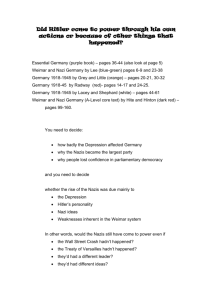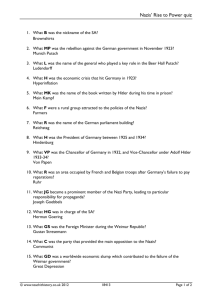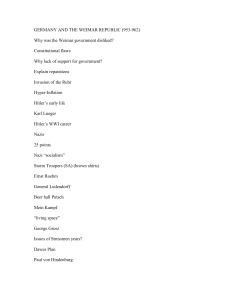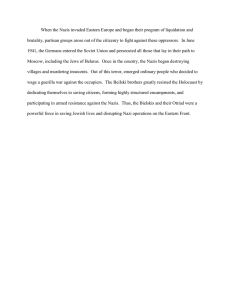AUSTRIA BURIES REMAINS OF CHILDREN NAZIS LABELED “WORTHLESS” AND KILLED
advertisement
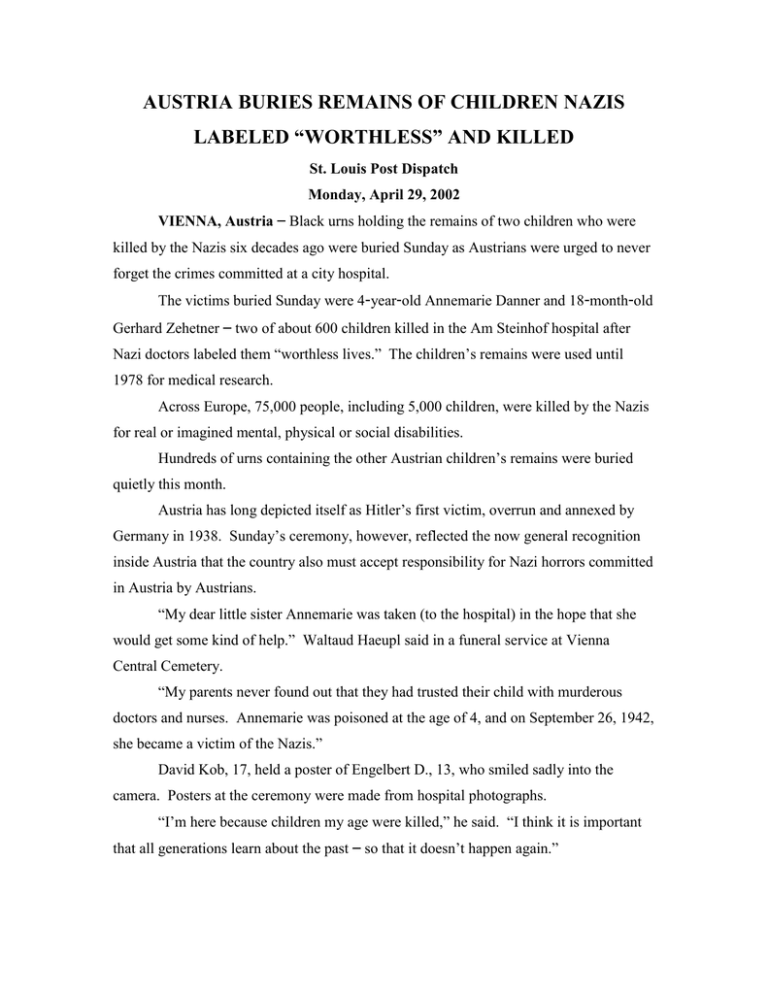
AUSTRIA BURIES REMAINS OF CHILDREN NAZIS LABELED “WORTHLESS” AND KILLED St. Louis Post Dispatch Monday, April 29, 2002 VIENNA, Austria – Black urns holding the remains of two children who were killed by the Nazis six decades ago were buried Sunday as Austrians were urged to never forget the crimes committed at a city hospital. The victims buried Sunday were 4-year-old Annemarie Danner and 18-month-old Gerhard Zehetner – two of about 600 children killed in the Am Steinhof hospital after Nazi doctors labeled them “worthless lives.” The children’s remains were used until 1978 for medical research. Across Europe, 75,000 people, including 5,000 children, were killed by the Nazis for real or imagined mental, physical or social disabilities. Hundreds of urns containing the other Austrian children’s remains were buried quietly this month. Austria has long depicted itself as Hitler’s first victim, overrun and annexed by Germany in 1938. Sunday’s ceremony, however, reflected the now general recognition inside Austria that the country also must accept responsibility for Nazi horrors committed in Austria by Austrians. “My dear little sister Annemarie was taken (to the hospital) in the hope that she would get some kind of help.” Waltaud Haeupl said in a funeral service at Vienna Central Cemetery. “My parents never found out that they had trusted their child with murderous doctors and nurses. Annemarie was poisoned at the age of 4, and on September 26, 1942, she became a victim of the Nazis.” David Kob, 17, held a poster of Engelbert D., 13, who smiled sadly into the camera. Posters at the ceremony were made from hospital photographs. “I’m here because children my age were killed,” he said. “I think it is important that all generations learn about the past – so that it doesn’t happen again.” Vienna hoped to close a gruesome chapter of wartime history with the ceremony. But news reports Saturday suggested that body parts from other slain children still might be stored at another Vienna hospital. Officials have promised an investigation. President Thomas Klestil said Sunday’s ceremony symbolized the importance of never forgetting and he urged Austrians to consider “the worth and role of disabled people.” Several of those linked to the killings thrived in postwar Austria. Dr. Heinrich Gross, now 85, a psychiatrist who some survivors say tortured them, received a high state award. Two years ago, he escaped trial on accusations of killing children by pleading dementia. You should remember that the Nazis developed a Euthanasia Program, code name T-4. Between 1939 and 1941 more than 70,000 mentally and physically disabled people were transferred to these so-called mercy killing centers where they were gassed. One of the Euthanasia centers was situated in Austria. True, the Austrians were invaded by Hitler a few years before the second World War broke out. But most Austrians, however, greeted Hitler with open arms. For years, a very influential Austrian Nazi Party had been in existence and worked closely with the Nazis Party in Germany. The movies taken when Hitler and his soldiers marched into Vienna, show a very enthusiastic crowd waving Nazi flags. The majority of Austrians believed that their lives could only improve once their nation became part of the Third Reich. After all, they spoke the same language, were staunch Catholics as were their Bavarian neighbors in southern Germany and they too hated the Austrian Jews who had held some of the most prestigious positions in Austrian society. 1. Can you find any reason why the remains of some of these children should have been kept until 1978 for medical research? Does this fact tell us anything about the Austrians’ past collaboration with the Nazis and how they view this past?

